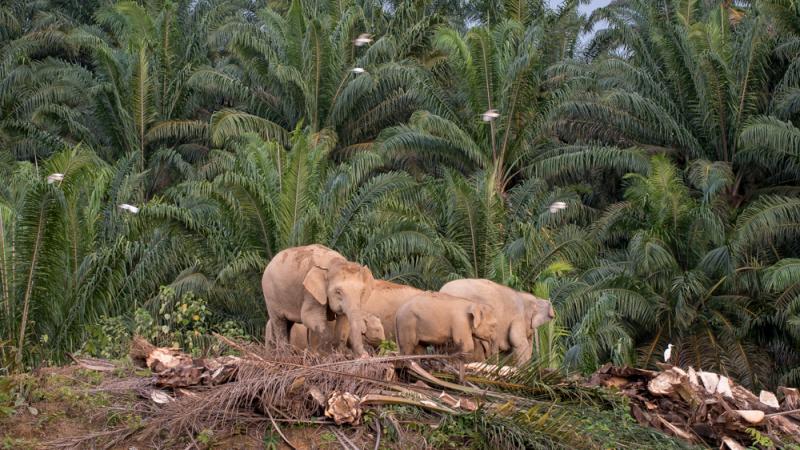Palm oil

Shifting to deforestation-free palm oil
Palm oil is used worldwide in thousands of products, from candy to shampoo to biodiesel. It's made from the fruit of the oil palm tree, which only grows in the tropics.
To make space for oil palm trees, some companies cut down and burn tropical forests, which leaves many species struggling to find food, mates and shelter. Without forests, animals can become easier targets for poachers and be forced into conflicts with humans.
In order to responsibly coexist with wildlife, the palm oil industry needs to avoid deforestation, maximize crop efficiency on existing plantations and allow wildlife to safely use the land. Together, these actions produce what is called "sustainable palm oil."
By advocating for an industry shift toward certified sustainable palm oil, we can protect and responsibly manage the tropical forests that support life on our planet.
You probably eat and use palm oil every day
Palm oil is in nearly half of all packaged food products sold in American grocery stores. It's in the majority of cosmetics. Many baby formulas, laundry detergents, toothpastes and shampoos contain palm oil. It can even be found in products as seemingly "additive-free" as milk. Hundreds of ingredients contains small amounts of palm oil and go by different names, which means many products contain palm oil even when it's not listed as an ingredient.
Boycotting palm oil won't necessarily help wildlife
Boycotting is a legitimate expression of consumers' environmental concerns, but it's not likely to save wildlife or forests. If consumers boycott palm oil, companies could buy alternative oils that may require up to nine times as much land to produce. Meanwhile, palm oil growers would have even less incentive to produce responsible palm oil.
The Oregon Zoo stands with the broader conservation community in advocating for a palm oil industry shift, not a boycott.
Certified sustainable palm oil will protect wildlife
In order to clean up palm oil's environmental record, companies must 1) stop deforestation, 2) maximize crop yields on their existing plantations, 3) plant only on degraded land and 4) allow wildlife to use the plantations without harassment. This is certified sustainable palm oil.
The role of the RSPO
The Roundtable on Sustainable Palm Oil (RSPO) is a not-for-profit certification standard made up of growers, buyers, investors, retailers and environmental and social organizations. Together, these stakeholders develop principles and criteria for shifting the industry toward more sustainable practices. Find out which products use RSPO certified palm oil by using the Palm Oil Scan app.
The Oregon Zoo is working to improve the palm oil industry
The Oregon Zoo is an RSPO member and believes the RSPO is the best existing pathway to transforming the palm oil industry. We also recognize the need to continuously improve the RSPO's processes, standards and pace of progress. We are committed to playing an active role in improving the RSPO. No single stakeholder group within the RSPO can fix the palm oil problem; it must be the shared responsibility of producers, buyers, financers, conservation organizations and end consumers.
To protect biodiversity, we must coexist
We have already lost much of our tropical forests worldwide. We must protect the forests that remain, but we must also help species, including orangutans and elephants, survive within human-made landscapes such as oil palm plantations. Building corridors that connect habitats and supporting human-wildlife coexistence are two ways we can help wildlife adapt.
The Oregon Zoo is helping wildlife survive in oil palm landscapes
Many species represented at the Oregon Zoo – including orangutans, tigers, elephants and chimpanzees – are threatened by unsustainable palm oil production. Chendra, a much-beloved member of the Oregon Zoo elephant family, was orphaned and injured as a direct result of palm oil production.
Through partnerships in Malaysia and Indonesia, the Oregon Zoo is improving the welfare of wildlife impacted by palm oil, and supporting efforts toward peaceful coexistence between humans and wildlife.
We must address all drivers of deforestation, including palm oil
While palm oil gets the most attention, timber, beef and soy all drive more deforestation. To responsibly manage forests worldwide, we need to focus on making all commodities more sustainable.

